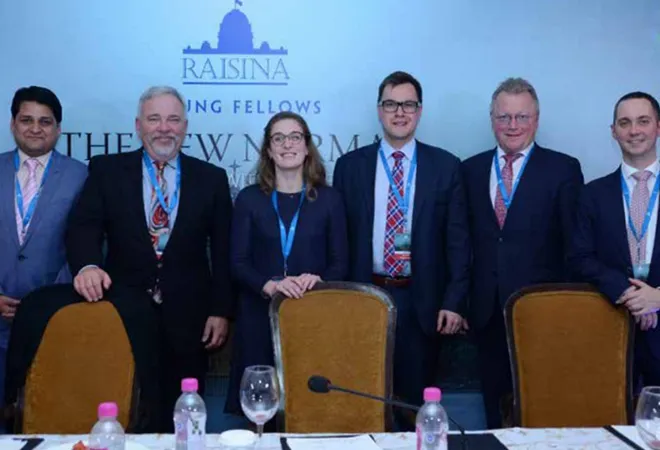-
CENTRES
Progammes & Centres
Location
The shared history and its repercussions — which raises doubts regarding a Cold War-like confrontation — limits possibility of such recurrence.

The metaphor of “Cold War” was first used in a 1945 essay titled “You and the Atom Bomb” by George Orwell. For the next 45 years, the metaphor dominated world politics by denoting the divide between the two power blocs: the US and the Soviet Union. Though the Cold War ended more than 25 years ago, ongoing tensions between the West and the Soviet successor, Russia, over Ukraine has once again spurred debates on the return of a Cold War.
If one goes back in time, one can recall that a prolonged crisis in Ukraine has been in place since late 2013 when the then Ukrainian President Viktor Yanukovych refused to sign the Association Agreement with the European Union (EU). The subsequent ouster of Yanukovych followed by Russia’s annexation of Crimea in 2014—a full-blown civil war in eastern Ukraine—ushered a new period of confrontation between the West and Russia. The roots of the crisis, however, lie in the 2008 Russia–Georgia War, which raised new questions regarding the existing borders recognised after the dissolution of the Soviet Union.
Russia’s annexation of Crimea has sparked widespread concern among western policymakers, raising fear that the former has embarked on a more confrontational policy, forcing the West to view Russia’s actions as those of a revisionist power. The annexation of Crimea in early 2014, in particular, has led the US and the EU to conclude that Moscow’s actions are reflective of its core desire to regain its once-held great-power posture. Russia, in turn, feels that the West has contributed to the developments in Ukraine. This largely stems from Russia’s concerns regarding the North Atlantic Treaty Organisation (NATO) and the eastern expansion of the EU. However, as a military power, Russia’s concerns about NATO are stronger because of its belief that the United Nations alone is responsible for decisions on the use of military forces.
Panellists for a session on “Cold War 2.0” established that three factors are crucial while talking about the global order in the present geopolitical context: the main actors and structures of the system; intentions of these actors; and capabilities of these actors. Looking at these, the present situation does not qualify for Cold War 2.0, especially since — unlike the Cold War period — many new centres of power have emerged in the 21st century.
The world today is interdependent, courtesy globalisation, which limits action-taking capabilities of an actor. The same holds true in the Ukrainian crisis, which has displayed the extent to which the actors could go in the domain of military, economic as well as political spheres.
Panellists pointed out that it is crucial to note that even at the height of tension, both the West and Russia resorted to economic sanctions as a deterrence despite its limiting nature. The sanctions proved detrimental, particularly for the EU–Russia bilateral trade, which were reduced to about $235 billion, approximately $165 billion less than what it was before the imposition of sanctions.
Further, the fear of a nuclear war does not loom large in the psyche of ordinary citizens. It could thus be said that the shared history and its repercussions, which raises doubts regarding a Cold War-like confrontation between the West and Russia, limits the possibility of such a recurrence. The current situation could best be described as what Feodor Voytolovsky, Deputy Director of International Politics at Russia’s Primakov Institute, refers to as the “metaphor of metaphor of Cold War” of an analytical model that dominated the latter half of the 20th century.
If there is a new Cold War, you will see both sides taking risks in their force postures to increase their ability to respond quickly to any sort of provocation in military sense. But that quite hasn’t happened yet. — James Wirtz, Dean SIGS, Naval Postgraduate School, USA
Meanwhile, as a growing economy and stakeholder in world politics, the current geopolitical scenario has repercussions for India as well. During the Cold War, India had tried to stay away from the two blocs under its policy of non-alignment. With its willingness to be an important “pole” of the multipolar order, India is now in the midst of a unique position. Since Russia has remained an important pillar in the Indian foreign policy framework, the rhetoric of Cold War 2.0 and greater competition with the US puts strain on India’s foreign policies. As Distinguished Fellow and Head of ORF’s Strategic Studies Programme Harsh Pant opines, the impression of Russia’s worldview through the geopolitical prism of its engagement with the US implies that the same prism works in its view of South Asia. This strains the traditional Indo-Russian relations, given the latter’s proximity to China and Pakistan.
The views expressed above belong to the author(s). ORF research and analyses now available on Telegram! Click here to access our curated content — blogs, longforms and interviews.